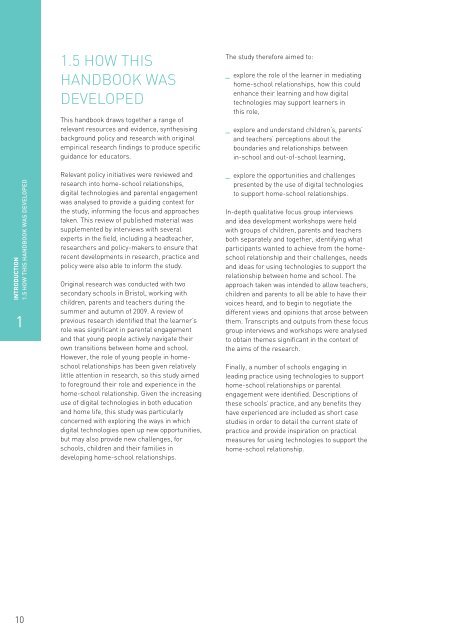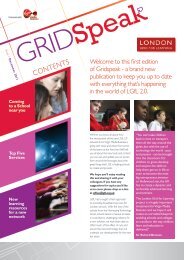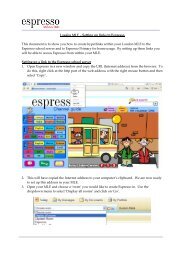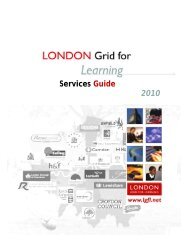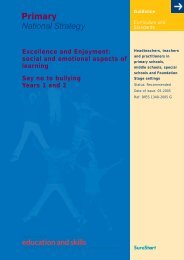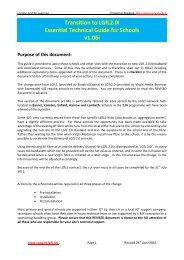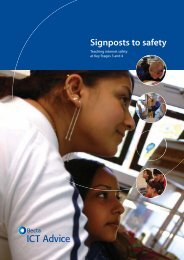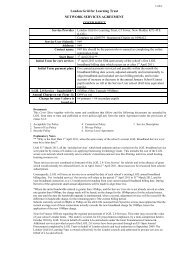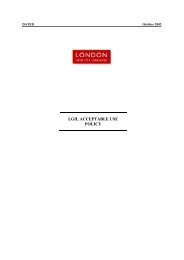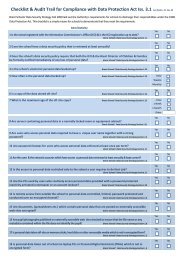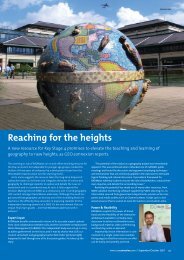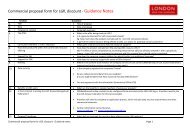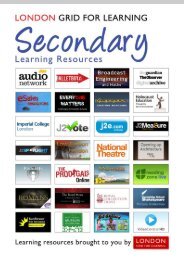Developing the home-school relationship using digital ... - Futurelab
Developing the home-school relationship using digital ... - Futurelab
Developing the home-school relationship using digital ... - Futurelab
- No tags were found...
You also want an ePaper? Increase the reach of your titles
YUMPU automatically turns print PDFs into web optimized ePapers that Google loves.
1.5 HOW THISHANDBOOK WASDEVELOPEDThis handbook draws toge<strong>the</strong>r a range ofrelevant resources and evidence, syn<strong>the</strong>sisingbackground policy and research with originalempirical research findings to produce specificguidance for educators.The study <strong>the</strong>refore aimed to:_ explore <strong>the</strong> role of <strong>the</strong> learner in mediating<strong>home</strong>-<strong>school</strong> <strong>relationship</strong>s, how this couldenhance <strong>the</strong>ir learning and how <strong>digital</strong>technologies may support learners inthis role,_ explore and understand children’s, parents’and teachers’ perceptions about <strong>the</strong>boundaries and <strong>relationship</strong>s betweenin-<strong>school</strong> and out-of-<strong>school</strong> learning,INTRODUCTION1.5 HOW THIS HANDBOOK WAS DEVELOPED1Relevant policy initiatives were reviewed andresearch into <strong>home</strong>-<strong>school</strong> <strong>relationship</strong>s,<strong>digital</strong> technologies and parental engagementwas analysed to provide a guiding context for<strong>the</strong> study, informing <strong>the</strong> focus and approachestaken. This review of published material wassupplemented by interviews with severalexperts in <strong>the</strong> field, including a headteacher,researchers and policy-makers to ensure thatrecent developments in research, practice andpolicy were also able to inform <strong>the</strong> study.Original research was conducted with twosecondary <strong>school</strong>s in Bristol, working withchildren, parents and teachers during <strong>the</strong>summer and autumn of 2009. A review ofprevious research identified that <strong>the</strong> learner’srole was significant in parental engagementand that young people actively navigate <strong>the</strong>irown transitions between <strong>home</strong> and <strong>school</strong>.However, <strong>the</strong> role of young people in <strong>home</strong><strong>school</strong><strong>relationship</strong>s has been given relativelylittle attention in research, so this study aimedto foreground <strong>the</strong>ir role and experience in <strong>the</strong><strong>home</strong>-<strong>school</strong> <strong>relationship</strong>. Given <strong>the</strong> increasinguse of <strong>digital</strong> technologies in both educationand <strong>home</strong> life, this study was particularlyconcerned with exploring <strong>the</strong> ways in which<strong>digital</strong> technologies open up new opportunities,but may also provide new challenges, for<strong>school</strong>s, children and <strong>the</strong>ir families indeveloping <strong>home</strong>-<strong>school</strong> <strong>relationship</strong>s._ explore <strong>the</strong> opportunities and challengespresented by <strong>the</strong> use of <strong>digital</strong> technologiesto support <strong>home</strong>-<strong>school</strong> <strong>relationship</strong>s.In-depth qualitative focus group interviewsand idea development workshops were heldwith groups of children, parents and teachersboth separately and toge<strong>the</strong>r, identifying whatparticipants wanted to achieve from <strong>the</strong> <strong>home</strong><strong>school</strong><strong>relationship</strong> and <strong>the</strong>ir challenges, needsand ideas for <strong>using</strong> technologies to support <strong>the</strong><strong>relationship</strong> between <strong>home</strong> and <strong>school</strong>. Theapproach taken was intended to allow teachers,children and parents to all be able to have <strong>the</strong>irvoices heard, and to begin to negotiate <strong>the</strong>different views and opinions that arose between<strong>the</strong>m. Transcripts and outputs from <strong>the</strong>se focusgroup interviews and workshops were analysedto obtain <strong>the</strong>mes significant in <strong>the</strong> context of<strong>the</strong> aims of <strong>the</strong> research.Finally, a number of <strong>school</strong>s engaging inleading practice <strong>using</strong> technologies to support<strong>home</strong>-<strong>school</strong> <strong>relationship</strong>s or parentalengagement were identified. Descriptions of<strong>the</strong>se <strong>school</strong>s’ practice, and any benefits <strong>the</strong>yhave experienced are included as short casestudies in order to detail <strong>the</strong> current state ofpractice and provide inspiration on practicalmeasures for <strong>using</strong> technologies to support <strong>the</strong><strong>home</strong>-<strong>school</strong> <strong>relationship</strong>.10


